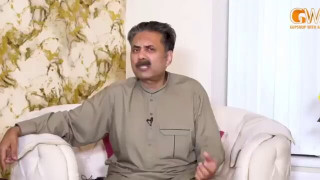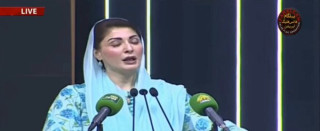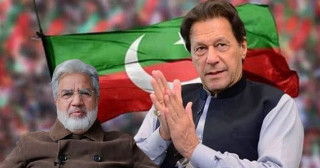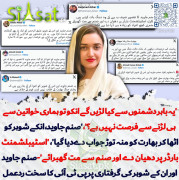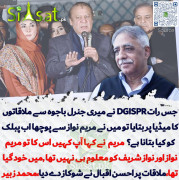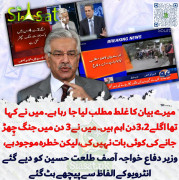M Ali Khan
Minister (2k+ posts)
BY REJECTING A NOTIFICATION ISSUED BY THE PRIME MINISTERS OFFICE, THE ARMY HAS PROVEN THE CIVIL-MILITARY DIVIDE INITIALLY REPORTED BY DAWN

A tweet on Saturday, April 29, at 2:52 p.m. from @OfficialDGISPR, the handle maintained by the current Director-General of Inter-Service Public Relations, sent the government and media into tizzy.
The tweet read: Notification on Dawn Leak is incomplete and not in line with recommendations by the Inquiry Board. Notification is rejected.
The public snub was in response to a letter (order) issued from the Prime Ministers Office by his Principal Secretary. The order referred to para 18 of the inquiry report in the issue of the Dawn leak and said that (a) the matter had been referred to the All Pakistan Newspapers Society (APNS), which, in addition to recommending disciplinary action against Dawn newspaper, its editor and its reporter is also supposed to frame a code of conduct for reporting on news of national security and importance; (b) Rao Tehseen, Principal Information Officer, Ministry of Information, has been removed under E&D Rules and will be proceeded against; and (c) the portfolio of Tariq Fatemi, Special Assistant to the Prime Minister on Foreign Affairs, had been withdrawn.
The letter, sent to the interior and information ministries and the cabinet and establishment divisions, ends with: Further necessary action may be taken accordingly by the concerned Ministries and Divisions.
Lets consider some issues here, beginning with the tweet.
Theres a general sense, also reflected in analyses and on social media, that the tweet comes from ISPR, signed off by the DG, a two-star. Thats wrong. Nothing can be put forward by the ISPR on its own steam. Everything is vetted, at a minimum, by the office of the Chief of General Staff and, in most cases, by the Chief of Army Staff secretariat.
Put another way, the tweet by Maj.-Gen Ghafoor is not his personal opinion but the response of the Army as an institution.
Next up is the issue of the probity of the tweet. There are two vital concerns here. One relates to the public rejection of an order from the Prime Ministers Office, the highest in the land, the other is about using Twitter as the medium.
It is extremely unfortunate, leaving aside other factors, that the Army, for some time now, has chosen to voice itself on Twitter on matters for which there are institutional mechanisms available under either the Constitution or through acts of Parliament. One such forum is the Cabinet Committee of National Security, which has all the relevant people, civil and military, as its members, and which is headed by the prime minister. Theres of course always the option of the Army chief meeting with the P.M. and/or other concerned ministers.
Twitter is a 140-character platform and while it can be useful for voicing certain things, it can be poison if the Army decides that from now on it will start communicating with other institutions of the state through a staccato medium which, in its brevity, is neither the soul of wit nor of lingerie and which, in fact, is far too often weighed down by the ridiculous than the sublime. Unless, and this is important, the Army is either being plain stupid or deliberately offensive. I will wager my money on the latter.
Theres deep irony here. Very deep, in fact. But for that we have to go back to the Dawn story from where it all began. The story basically said that in a high-level meeting the civilians told the military officials present that the world is not prepared to accept the distinction between good and bad terrorist groups and Pakistan has to move against everyone. The civilians then told the military officers that action must be taken against all.
The Army reacted sharply to the story and pushed for an inquiry into who had leaked this while, at the same time, calling the story concocted. However, it also said that the story had compromised national security and the people responsible should be punished. In other words, Dawn printed a concocted story which, nonetheless, had managed to breach national security by (a) giving the impression that while the civilians wanted to act against all the groups, the Army was somehow reluctant and (b) this showed that there was a fault-line between the civilian and military enclaves. These impressions, it was said, jeopardized national security.
Up until now, it is not clear whether people should be punished for constructing a story where there was none or for leaking to a newspaper something that actually happened and which mustnt have been shared with anyone outside of that room. If its the latter, then it is quite clear that the storys veracity cannot be challenged. Also clear is the fact that there is a fault-line between the civilian and military enclaves.
And if it can be determined that there is such a fault-line, it becomes moot to challenge the very definition of national security being trotted by the Army and which it thinks has been compromised by Dawn by making such differences public. But that is a separate topic and its treatment would force us to start talking about the subversion of the Constitution by the generals and unauthorized operations et cetera.
The deep irony that I talked about is related to the fact that the ISPRs public tweet, retweeted and liked thousands of times, puts an absolute stamp on that fault-line, the civil-military divide. Put another way, while Dawn must be castigated for giving a false impression about such a divide, the Army, through ISPR, can do a perfect, public job of confirming it.
The Armys view is, and I say this on the basis of the arguments presented to me, that the inquiry board has determined that national security was breached, the inquiry board named those responsible, and suggested what needs to be done. None of that is reflected in the order that has come out of the PMO and the reference to para 18 means nothing because people dont have access to the report or para 18. In other words, the PMO has tried to whitewash the report and that is unacceptable. This is not about the P.M.s person or the civilian government but the state.
To this, heres what I would say and recommend:
One, regardless of anything, the PMO is the highest office in the land. Until Nawaz Sharif is removed as the prime minister, he remains one and continues to enjoy his constitutional privileges.
Two, the Army should, once and for all, accept that using Twitter for inter-governmental communication betrays a woeful lack of understanding of the platform. [NB: President Trump is constantly being ridiculed and mimicked in the U.S. for his morning Twitter diarrhea.]
Three, the PMO should release the report, as also past reports, beginning with the Hamoodur Rehman Commission Report.
Four, it is important to release this report so we can see how the inquiry board defined national security and how it determined that national security was compromised by the Dawn report. At least, if we are not satisfied by either the definition or the determination, we can then take the issue to a court of law.
I think we will all agree that a state is far more than just its Army and the definition of national security lies firmly within the domain of the civilian government. Lets have some good come out of this by making the report public so we can agree with or, conversely, challenge the inquiry boards idea of national security.
Haider is editor of national-security affairs at Capital TV. He was a Ford Scholar at the Program in Arms Control, Disarmament and International Security at the University of Illinois at Urbana-Champaign, and a visiting fellow at the Brookings Institution, Washington, D.C. He tweets @ejazhaider
http://newsweekpakistan.com/tweeting-differences/

A tweet on Saturday, April 29, at 2:52 p.m. from @OfficialDGISPR, the handle maintained by the current Director-General of Inter-Service Public Relations, sent the government and media into tizzy.
The tweet read: Notification on Dawn Leak is incomplete and not in line with recommendations by the Inquiry Board. Notification is rejected.
The public snub was in response to a letter (order) issued from the Prime Ministers Office by his Principal Secretary. The order referred to para 18 of the inquiry report in the issue of the Dawn leak and said that (a) the matter had been referred to the All Pakistan Newspapers Society (APNS), which, in addition to recommending disciplinary action against Dawn newspaper, its editor and its reporter is also supposed to frame a code of conduct for reporting on news of national security and importance; (b) Rao Tehseen, Principal Information Officer, Ministry of Information, has been removed under E&D Rules and will be proceeded against; and (c) the portfolio of Tariq Fatemi, Special Assistant to the Prime Minister on Foreign Affairs, had been withdrawn.
The letter, sent to the interior and information ministries and the cabinet and establishment divisions, ends with: Further necessary action may be taken accordingly by the concerned Ministries and Divisions.
Lets consider some issues here, beginning with the tweet.
Theres a general sense, also reflected in analyses and on social media, that the tweet comes from ISPR, signed off by the DG, a two-star. Thats wrong. Nothing can be put forward by the ISPR on its own steam. Everything is vetted, at a minimum, by the office of the Chief of General Staff and, in most cases, by the Chief of Army Staff secretariat.
Put another way, the tweet by Maj.-Gen Ghafoor is not his personal opinion but the response of the Army as an institution.
Next up is the issue of the probity of the tweet. There are two vital concerns here. One relates to the public rejection of an order from the Prime Ministers Office, the highest in the land, the other is about using Twitter as the medium.
It is extremely unfortunate, leaving aside other factors, that the Army, for some time now, has chosen to voice itself on Twitter on matters for which there are institutional mechanisms available under either the Constitution or through acts of Parliament. One such forum is the Cabinet Committee of National Security, which has all the relevant people, civil and military, as its members, and which is headed by the prime minister. Theres of course always the option of the Army chief meeting with the P.M. and/or other concerned ministers.
Twitter is a 140-character platform and while it can be useful for voicing certain things, it can be poison if the Army decides that from now on it will start communicating with other institutions of the state through a staccato medium which, in its brevity, is neither the soul of wit nor of lingerie and which, in fact, is far too often weighed down by the ridiculous than the sublime. Unless, and this is important, the Army is either being plain stupid or deliberately offensive. I will wager my money on the latter.
Theres deep irony here. Very deep, in fact. But for that we have to go back to the Dawn story from where it all began. The story basically said that in a high-level meeting the civilians told the military officials present that the world is not prepared to accept the distinction between good and bad terrorist groups and Pakistan has to move against everyone. The civilians then told the military officers that action must be taken against all.
The Army reacted sharply to the story and pushed for an inquiry into who had leaked this while, at the same time, calling the story concocted. However, it also said that the story had compromised national security and the people responsible should be punished. In other words, Dawn printed a concocted story which, nonetheless, had managed to breach national security by (a) giving the impression that while the civilians wanted to act against all the groups, the Army was somehow reluctant and (b) this showed that there was a fault-line between the civilian and military enclaves. These impressions, it was said, jeopardized national security.
Up until now, it is not clear whether people should be punished for constructing a story where there was none or for leaking to a newspaper something that actually happened and which mustnt have been shared with anyone outside of that room. If its the latter, then it is quite clear that the storys veracity cannot be challenged. Also clear is the fact that there is a fault-line between the civilian and military enclaves.
And if it can be determined that there is such a fault-line, it becomes moot to challenge the very definition of national security being trotted by the Army and which it thinks has been compromised by Dawn by making such differences public. But that is a separate topic and its treatment would force us to start talking about the subversion of the Constitution by the generals and unauthorized operations et cetera.
The deep irony that I talked about is related to the fact that the ISPRs public tweet, retweeted and liked thousands of times, puts an absolute stamp on that fault-line, the civil-military divide. Put another way, while Dawn must be castigated for giving a false impression about such a divide, the Army, through ISPR, can do a perfect, public job of confirming it.
The Armys view is, and I say this on the basis of the arguments presented to me, that the inquiry board has determined that national security was breached, the inquiry board named those responsible, and suggested what needs to be done. None of that is reflected in the order that has come out of the PMO and the reference to para 18 means nothing because people dont have access to the report or para 18. In other words, the PMO has tried to whitewash the report and that is unacceptable. This is not about the P.M.s person or the civilian government but the state.
To this, heres what I would say and recommend:
One, regardless of anything, the PMO is the highest office in the land. Until Nawaz Sharif is removed as the prime minister, he remains one and continues to enjoy his constitutional privileges.
Two, the Army should, once and for all, accept that using Twitter for inter-governmental communication betrays a woeful lack of understanding of the platform. [NB: President Trump is constantly being ridiculed and mimicked in the U.S. for his morning Twitter diarrhea.]
Three, the PMO should release the report, as also past reports, beginning with the Hamoodur Rehman Commission Report.
Four, it is important to release this report so we can see how the inquiry board defined national security and how it determined that national security was compromised by the Dawn report. At least, if we are not satisfied by either the definition or the determination, we can then take the issue to a court of law.
I think we will all agree that a state is far more than just its Army and the definition of national security lies firmly within the domain of the civilian government. Lets have some good come out of this by making the report public so we can agree with or, conversely, challenge the inquiry boards idea of national security.
Haider is editor of national-security affairs at Capital TV. He was a Ford Scholar at the Program in Arms Control, Disarmament and International Security at the University of Illinois at Urbana-Champaign, and a visiting fellow at the Brookings Institution, Washington, D.C. He tweets @ejazhaider
http://newsweekpakistan.com/tweeting-differences/
Last edited by a moderator:

